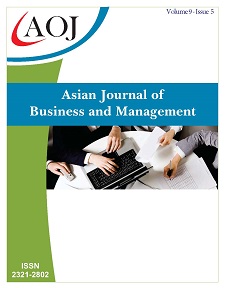Experience in Supporting Industry Development in Japan and Lessons for Viet Nam
DOI:
https://doi.org/10.24203/ajbm.v9i5.6828Keywords:
Purchasing power parity (PPP), Gross Domestic product (GDP), group of 7 richest countries in the world (G7)Abstract
Japan is the world's 3rd largest economy with a nominal GDP of USD 5380 billion. Japan's economy has a rapid industrial development process after its defeat in World War II. Vietnam's economy in 2020 will achieve GDP growth of 2.9%, nominal GDP of 300 billion dollars, per capita income reached $2786, if calculated according to purchasing power parity (PPP), the average income of Vietnamese people is about $ 8,500. In 2020, Vietnam has a trade surplus of 19.1 billion USD (an important contribution to this result is the total two-way turnover of 39.6 billion USD, a trade deficit of 1.1 billion USD from Japan. No small contribution to the economic success of Vietnam as a strategic partner of Japan - the third largest economy in the world. Japan is the first country in the G7 group to recognize Vietnam as a market economy and partner, the largest ODA sponsor for Vietnam, the number 1 investor in Vietnam and the 3rd largest trading partner of Vietnam. This paper also refers the lessons learned for Vietnam.
References
“Phát triển toàn diện hơn quan hệ hệ đối tác chiến lược Việt- Nhật”, Báo Lao động, tháng 1/2013.
“Tăng cường quan hệ đối tác chiến lược Việt Nam- Nhật Bản”, Báo Quân đội nhân dân, tháng 10/2010.
“Tìm cách đưa công nghiệp phụ trợ Nhật Bản vào Việt Nam”, Hội nghị thu hút các doanh nghiệp vừa và nhỏ của Nhật vào các khu công nghiệp tại Việt Nam, ngày 28/2/2012 tại Tp. HCM
Anjali Kumar (1997),"Theregulation of non-bank FINANCIAL INSTITUTIONS: The United States, the European Union, and OtherCountries",Discussion Paper No 362, World Bank, page 20.
Audretsch, DB, and H. Yamawaki. 1988. “R&D Rivalry, Industrial Policy, and US-Japan Trade.” Review of Economics and Statistics.
Auty, RM 1991. “Creating Comparative Advantage: South Korean Steel and Petrochemicals.” Tijdschrift voor Economie en Social Geografie 82(1): 15–29.
Baker & McKenzie (2013), Doing Business in Thailand in 2013, Documents introduced by the Office of Bangkok, (7).
Balassa, B. 1990. Economic Policies in the Pacific Area Developing Countries. London: Macmillan.
Balassa, B., and M. Noland. 1988. Japan in the World Economy. Washington: Institute for International Economics. 1989. “The Changing Comparative Advantage of Japan and the United States.” Journal of the Japanese and International Economies 3(2): 174–88.
Baldwin, RE, and PR Krugman. 1988. “Market Access and International Competition: A Simulation Study of 16K Random Access Memories.” In Empirical Methods for International Trade, edited by R. Feenstra. MIT Press.
Boss & Young Patent & Trademark Law Office (2013), The China Stock Exchange – IPOreview,Beijing, (8), page 1-3.
Chen Daisong (2009), "Legal development in China: securities market khi three decades of Reform andopening-up",East China University of Political Science and Law, Documentation for the program ASLI (ASLI Visiting Fellow), Asia Law Institute, ( 8).
Chiwen (2014), "Chinese securities companies: An analysis of Economic Growth", Chinese Journal ofAnalysis, (9), tr.27
Đỗ Quyên, “Làm sâu sắc quan hệ đối tác chiến lược Việt – Nhật”, Báo Dân trí điện tử, tháng 1/2013,
Jingyun Ma, Song Fengming, Zhishu Yang (2009), "The Dual Role of the Government: securities market regulation in China 1980-2007",School of Economics and Management, Tsinghua University, China, Journal of Practice and Financial adjustment.
OECD (2002), Debt Management and Government Securities Markets in the 21stCentury.
Pricewaterhousecoopers, Entering the United States SecuritiesMarkets.
Thu Hương, “Toàn cảnh công nghiệp hỗ trợ và công nghiệp Nhật bản”, Tạp chí Tài chính, tháng 3/2013,
Triển lãm công nghiệp hỗ trợ Việt Nam “3 trong 1”, Báo Tin tức - Thông tấn xã Việt Nam, ngày 28/02/2013.
Xiao Chen, Chi-Wen Jevons Lee, Jing Li (2013), "ChineseTango",Government Assisted Earnings Management; School of Economics and Management, Tsinghua University, China.
Downloads
Published
Issue
Section
License
Copyright (c) 2021 Asian Journal of Business and Management

This work is licensed under a Creative Commons Attribution-NoDerivatives 4.0 International License.
- Papers must be submitted on the understanding that they have not been published elsewhere (except in the form of an abstract or as part of a published lecture, review, or thesis) and are not currently under consideration by another journal published by any other publisher.
- It is also the authors responsibility to ensure that the articles emanating from a particular source are submitted with the necessary approval.
- The authors warrant that the paper is original and that he/she is the author of the paper, except for material that is clearly identified as to its original source, with permission notices from the copyright owners where required.
- The authors ensure that all the references carefully and they are accurate in the text as well as in the list of references (and vice versa).
- Authors retain copyright and grant the journal right of first publication with the work simultaneously licensed under a Creative Commons Attribution License that allows others to share the work with an acknowledgement of the work's authorship and initial publication in this journal.
- Authors are able to enter into separate, additional contractual arrangements for the non-exclusive distribution of the journal's published version of the work (e.g., post it to an institutional repository or publish it in a book), with an acknowledgement of its initial publication in this journal.
- Authors are permitted and encouraged to post their work online (e.g., in institutional repositories or on their website) prior to and during the submission process, as it can lead to productive exchanges, as well as earlier and greater citation of published work (See The Effect of Open Access).
- The journal/publisher is not responsible for subsequent uses of the work. It is the author's responsibility to bring an infringement action if so desired by the author.


